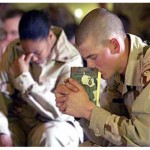Apr
29
Angels Among Us
Filed Under Treating PTSD | 2 Comments
 It was almost night again. He got through one more day, but it’s the nights that we worry about. He gave us all of his guns, just to be safe; yet, we all silently understood that life could easily be disposed of in many ways. A life that seemed to have lost its joy, its hope, its sense of purpose. The year before he discovered he had prostate cancer. Surgery took care of future problems in that area. Shortly after that he lost his wife. Divorce can be devastating – feeling even more so than death, because your loved one is gone. Gone of her own free will, finally realizing that enough is enough. His sense of worth and caring is now at an all-time low. A few months later he came down with a serious case of West Nile virus. His body’s ravaged immune system made it impossible for him to work; he lost his job. Too much loss in so little time left his life tested by all the ghosts of the past – the ghosts from a place long ago, a place called Vietnam. The question ever present was how could he sustain the pain, grief, the disease? It was a question that kept all of us awake through the darkness. Something needed to be done to help him feel life was worth living. And this is when the miracle occurred. An angel appeared in the form of a soft, uncoordinated, four-legged, black Labrador who was given the earthly name, Wyatt. The small cherub gave unconditional love and joy. Now, when the lonely man woke in the night, the angel’s crazy antics made him laugh; something he hadn’t done in a very long time. The angel gave him a chance at a new beginning, a new existence beyond the solitude. This new place was called Hope.
It was almost night again. He got through one more day, but it’s the nights that we worry about. He gave us all of his guns, just to be safe; yet, we all silently understood that life could easily be disposed of in many ways. A life that seemed to have lost its joy, its hope, its sense of purpose. The year before he discovered he had prostate cancer. Surgery took care of future problems in that area. Shortly after that he lost his wife. Divorce can be devastating – feeling even more so than death, because your loved one is gone. Gone of her own free will, finally realizing that enough is enough. His sense of worth and caring is now at an all-time low. A few months later he came down with a serious case of West Nile virus. His body’s ravaged immune system made it impossible for him to work; he lost his job. Too much loss in so little time left his life tested by all the ghosts of the past – the ghosts from a place long ago, a place called Vietnam. The question ever present was how could he sustain the pain, grief, the disease? It was a question that kept all of us awake through the darkness. Something needed to be done to help him feel life was worth living. And this is when the miracle occurred. An angel appeared in the form of a soft, uncoordinated, four-legged, black Labrador who was given the earthly name, Wyatt. The small cherub gave unconditional love and joy. Now, when the lonely man woke in the night, the angel’s crazy antics made him laugh; something he hadn’t done in a very long time. The angel gave him a chance at a new beginning, a new existence beyond the solitude. This new place was called Hope.
Animals have a way of helping us through our trauma. Dogs, horses, cats… it really doesn’t matter just as long as the heart connection is made. The mental health professionals call it “animal therapy”. I call this, “Angels Among Us”.
(In our prior blog, one of our readers related his “angel” story as follows):
“For years and years I would constantly be told to “let go” or “forget about it” when it came to Vietnam. No one understood that I had relentlessly tried that, but it wouldn’t let go of me. For many years I managed to drink away many of the symptoms; unfortunately, that worked too well and I became addicted to my ‘medication’. I learned why that worked and was told by Dr Palmer that if he could prescribe any one medication that we both knew worked, it was alcohol, “but the side affects are a bitch” he said.
So, since 1996 I have been soberly searching for ways to handle the distress and disjointed aberrations of PTSD. As a result, I have found that immediate changes of venue, (physical location) and distraction help me to regain some steadiness. My second reliance is my dog, Babe, an Airedale that notices everything. She has awakened me during nightmares and licks me in the middle of the night if she detects something is not right with me. In exchange, I rely on her to know the safety of my surroundings. When she is calm there is no need for me to be alarmed.” (Mike MacDonald)
Angels calm our worst nightmares. They help us feel safer, saner – protected by a celestial, loving presence. We become braver because of their undying devotion. Yes, there are many angels among us, and they are called Chase, Bailey, Wyatt, Cody, and Babe…
Apr
26
Reflecting on a Comment
Filed Under Treating PTSD | 1 Comment
 Before I begin this blog I want to sincerely thank all of you who are following our book and providing feedback. I am well aware of the time it takes to stay aligned with a variety of online communication. It is humbling to know that individuals and families are finding our website helpful, and we are truly grateful for your comments.
Before I begin this blog I want to sincerely thank all of you who are following our book and providing feedback. I am well aware of the time it takes to stay aligned with a variety of online communication. It is humbling to know that individuals and families are finding our website helpful, and we are truly grateful for your comments.
Michelle Rosenthal, a reader of our April 15th blog, commented that she liked the last line:
“If we send them, then we must mend them.”
This has been our motto and theme throughout the book and certainly needs to be fully endorsed by our military, our country, our leaders, and our communities. What was thoughtful about Michelle’s comment was her last line where she asked, “How do we mend them in a way that does not inappropriately bend them?” And that, Michelle, is a billion dollar question – one for which I do not have a tangible response. Yet, I can say this, the solution lies in making a difference – one individual at a time. Healing does not fit every military experience or veteran the same. There are far too many variables. However, a few constants will be required: relentless determination to getting better, standing up and trying again even when staying down seems much easier, support from a variety of people (family, friends, the VA…), and most of all a deep feeling of being loved and worthy of love, when at times we feel quite alone.
For those of us living with someone suffering from PTSD, love does not mean accepting or condoning inappropriate behavior from either person. It means putting proper boundaries on our actions, without battering each other. It means that we love and trust each other enough to know that we can get better and want to get better. It means we believe the relationship is worth the effort, the pain, and frustration as long as there is progress toward emotional healing. And in the end, the mending will more than likely require a bit of bending. Perhaps it is only through the “bending” that genuine healing can take place. The key word in Michelle’s comment was “appropriate” bending. In a heavy wind a tree bends – that is a good thing. I’m simply trusting that the tree will sustain the storm because its roots are deep and firmly grounded in an earth that holds tightly to its foundation. Hopefully, if our spiritual and emotional roots are deep and far reaching, perhaps we can and will sustain the storm within. Nothing is impossible.
Apr
15
What Others Say About PTSD
Filed Under PTSD treatment | 3 Comments
 In the last few months I have written about characteristics and effects of PTSD. Some of the information came from years of living with someone with PTSD. Some of it came from over a decade of research. And, some of the information was the result of interviews carried out over the last eight years with families, vets, and civilian populations. A recent blog focused on “What I know for Sure” about this illusive, emotional oppressor and I ended with a comment from a newspaper article where an Iraq veteran stated that admitting he had served in Iraq or Afghanistan was like the plague because employers were apprehensive about hiring vets with PTSD. Reading this put me into a very philosophical guilt trip. We are trying to educate communities, veterans, families and friends about Post-Traumatic Stress Disorder. However, by no means is the information meant to make the vet look incompetent or out of control. PTSD is like any other challenge. Most of the conflict occurs within the person, and behind closed doors. For the most part, few people outside the immediate family have little if any idea of the torment and struggle going on within the individual.
In the last few months I have written about characteristics and effects of PTSD. Some of the information came from years of living with someone with PTSD. Some of it came from over a decade of research. And, some of the information was the result of interviews carried out over the last eight years with families, vets, and civilian populations. A recent blog focused on “What I know for Sure” about this illusive, emotional oppressor and I ended with a comment from a newspaper article where an Iraq veteran stated that admitting he had served in Iraq or Afghanistan was like the plague because employers were apprehensive about hiring vets with PTSD. Reading this put me into a very philosophical guilt trip. We are trying to educate communities, veterans, families and friends about Post-Traumatic Stress Disorder. However, by no means is the information meant to make the vet look incompetent or out of control. PTSD is like any other challenge. Most of the conflict occurs within the person, and behind closed doors. For the most part, few people outside the immediate family have little if any idea of the torment and struggle going on within the individual.
While driving to Wyoming last week, I read an article in Scientific American by David Dobbs (April 2009) titled, “The Post-Traumatic Stress Trap”. The main idea of this piece centered on “a growing number of experts insist that the concept of post-traumatic stress disorder is itself disordered and that soldiers are suffering as a result” (p. 64). As I read the piece I both agreed and disagreed with what Mr. Dobbs wrote. There is no doubt that many people showing symptoms of any type of illness or disorder may be misdiagnosed, and when this occurs treatments are not only ineffective, but may even be harmful to the patient. PTSD is no exception. Just diagnosing, it can be tricky because its symptoms can mask other ailments such as depression, memory problems, and traumatic brain injuries. A helpful statement by Mr. Dobbs reminded the reader that for many vets returning from combat, normal readjustment may take months and even a few years to get back to regular existence. “Seeing most post-combat distress not as a disorder but as part of normal, if not painful, healing” (p. 68), may take some of the stigma away from the trauma of combat.
All of that is fine. Yet, as a researcher, I also know that for those who are misdiagnosed, many may never be identified due to lack of nearby medical facilities or lack of awareness. The last point Mr. Dobbs made, and I believe it is legitimate, refers to revising the rubric for more accurately diagnosing of PTSD. At any rate, the real challenge continues to be accurate identification of PTSD, effective treatment options, and correct information to increase awareness. PTSD is far more than a mere “adjustment” problem. The sufferer and the family need immediate and appropriate interventions if restorative health is to be obtained. As a nation, we have our work cut out for us, because a nation that forgets it warriors, fails its moral and humanitarian obligations to restore to physical and emotional health those it sends into battle. We must always take action; we must always remember that “If we send them, we must mend them”.
Apr
9
What I Know Now About PTSD
Filed Under Treating PTSD | Comments Off on What I Know Now About PTSD
 I thought some of you following our blog might like to read the few things I have learned in almost forty years of living with someone who has PTSD. The list is brief because I chose to focus on What I Know from years of experience, so here they are:
I thought some of you following our blog might like to read the few things I have learned in almost forty years of living with someone who has PTSD. The list is brief because I chose to focus on What I Know from years of experience, so here they are:
PTSD is an invisible ghost that appears in one’s emotional life at the most unexpected times.
- It is almost impossible to identify all of the triggers – i.e., things that remind the senses: sight, sound, touch, taste, and smell of the past trauma.
- PTSD is the second war the individual must fight once home and it is sometimes even more challenging to succeed.
- This second war can be as hideous as the first. It is often manifested in common places and homes of the veteran. It affects the entire family – parents, siblings, spouses, children….
- PTSD is like throwing a huge rock in the middle of a quiet pond. The ripples extend far beyond the rock’s impact. In many cases the displacement seems to suck everything in its path into a black hole where normal life disappears entirely.
- Ignoring PTSD symptoms does not make them go away. They continue to fester.
- And most hopeful, PTSD can be managed. It can be effectively controlled, but only if the person affected admits there is a problem. As with most problems, awareness is the first step to healing. Taking steps to get the appropriate help, taking the responsibility for the situation, and doing something to heal is absolutely the best, and sometimes the only viable way to move through the life journey with better emotional and physical health.
- One last comment to employers — A person who has fought in combat and served his/her country honorable will definitely serve your organization/company in equal fashion. He/she will be committed to the work and fellow workers. He will be focused on the task at hand and will be relentless in making sure that the job is done well. She will pay attention to the details as well as the big picture. He will be a dependable asset to your organization. And most of all, she deserves the opportunity to have a normal, prosperous, and stable life after what she gave to our country and to us.
Mike MacDonald of the Black Lions CO C 2/28, ’68-69’responded to this recent blog and I thought it was worth adding:
“Demonstrated Team Player” – I run a small company and there are certain things I automatically know about Vets. They can be as disciplined as they need be, are team players, accept direction, are usually task oriented and conscientious.” Thanks, Mike for your comments.

